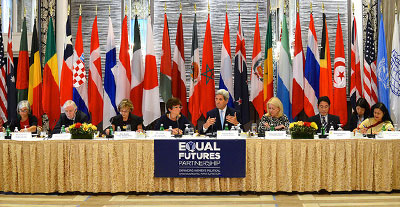Gender balance in politics and decision-making remains a challenge — Lakshmi Puri
Opening statement by UN Women Executive Director Lakshmi Puri at the Equal Futures Partnership Panel at UN Headquarters in New York, 22 September, 2014.Date:

[Check against delivery]
Excellencies,
Distinguished delegates and colleagues.
I thank United States President Barack Obama and Secretary of State John Kerry for their leadership and the Equal Futures Partnership.
UN Women very much values its role in the Equal Futures Partnership.
Partnership is vital in promoting societal change to transform the socially constructed norms, practices and beliefs that are the basis of gender inequalities. Partnership is also vital in ensuring that long-lasting gender-responsive development policies and programmes are fully implemented and positively impact women and girls everywhere.
UN Women is very proud to support the positive trends across the globe on women’s electoral and political participation, and access to senior decision-making positions. UN Women is working with the UN system and other partners to increase women’s participation in elections in more than 60 countries.
In addition, over 800 CEOs have signed up and publicly committed to supporting and implementing the Women’s Empowerment Principles that UN Women has developed with the UN Global Compact. These companies recognize the economic and social benefits of women’s empowerment, and that empowering women is not only the right thing to do, it makes sound business sense.
Yet gender balance in decision-making continues to challenge development partners. Twenty years after the Beijing Declaration and Platform for Action called for gender balance, women remain a significant minority among political leaders. Indeed, as of January 2014, only 5.9 per cent of all Heads of State were women; 7.8 per cent of all Heads of Government were women; and 14.8 per cent of all parliamentary speakers were women.
How can we redress this imbalance in the private and public sector?
First of all, we need enhanced political will. Without dedicated political commitment from governments, political parties and parliamentary leaders, women will not be represented on an equal basis among political decision-makers.
In addition, supporting mentoring programmes and developing clear career paths with quotas for women have proven to be extremely effective. Instituting work-life balance policies and statutory entitlements to accommodate caring responsibilities are also imperative if we are to get more women in the private and public sector and enable them to break through the glass ceiling.
Sharing research and evidence on how promoting and retaining women can prevent the loss of talent and experience will reinforce these efforts to ensure greater gender equality in economic decision-making in the private and public sphere.
Let us reaffirm that our values and ideals are enshrined in the UN Charter — of international cooperation, democracy, social justice and gender equality. May these values and ideals be at the core of our efforts to ensure the full incorporation of gender perspectives in the post-2015 process. And also in our commitment to mobilize the resources required for achieving gender-responsive outcomes and bring about the changes to which development partners committed themselves in Beijing almost 20 years ago.
I look forward to hearing of the progress of your national commitments and to hear of the new intentions of the United Kingdom and Chile.